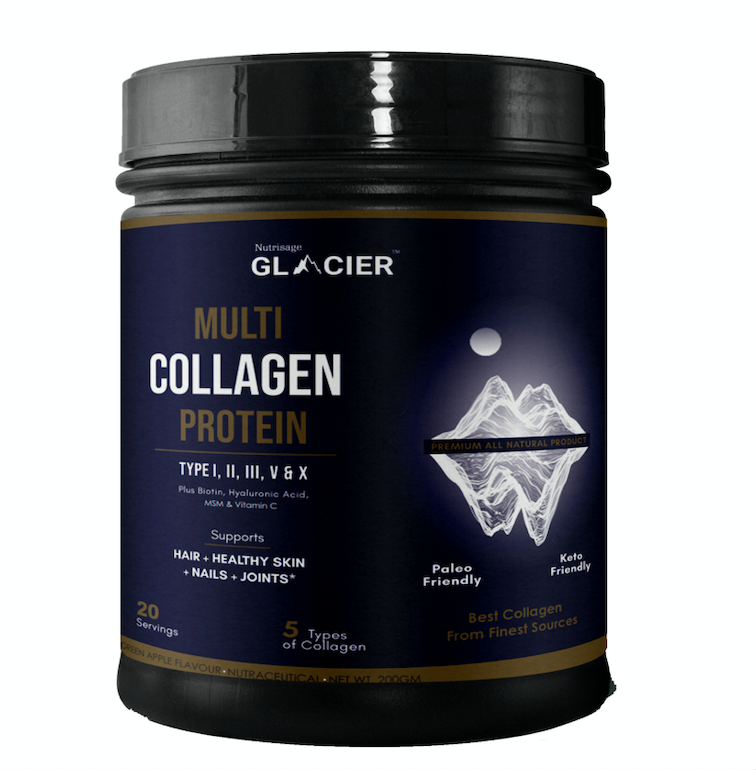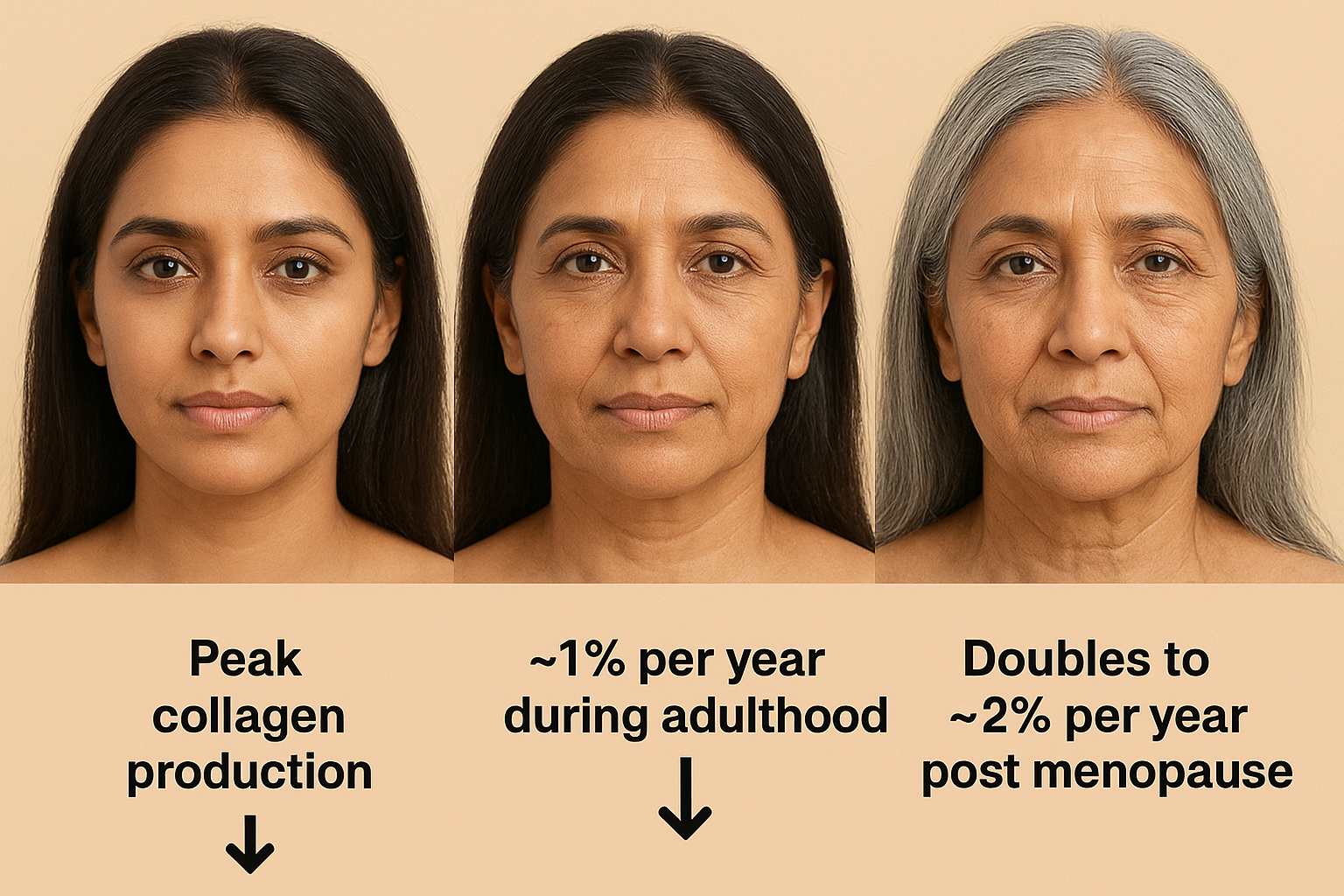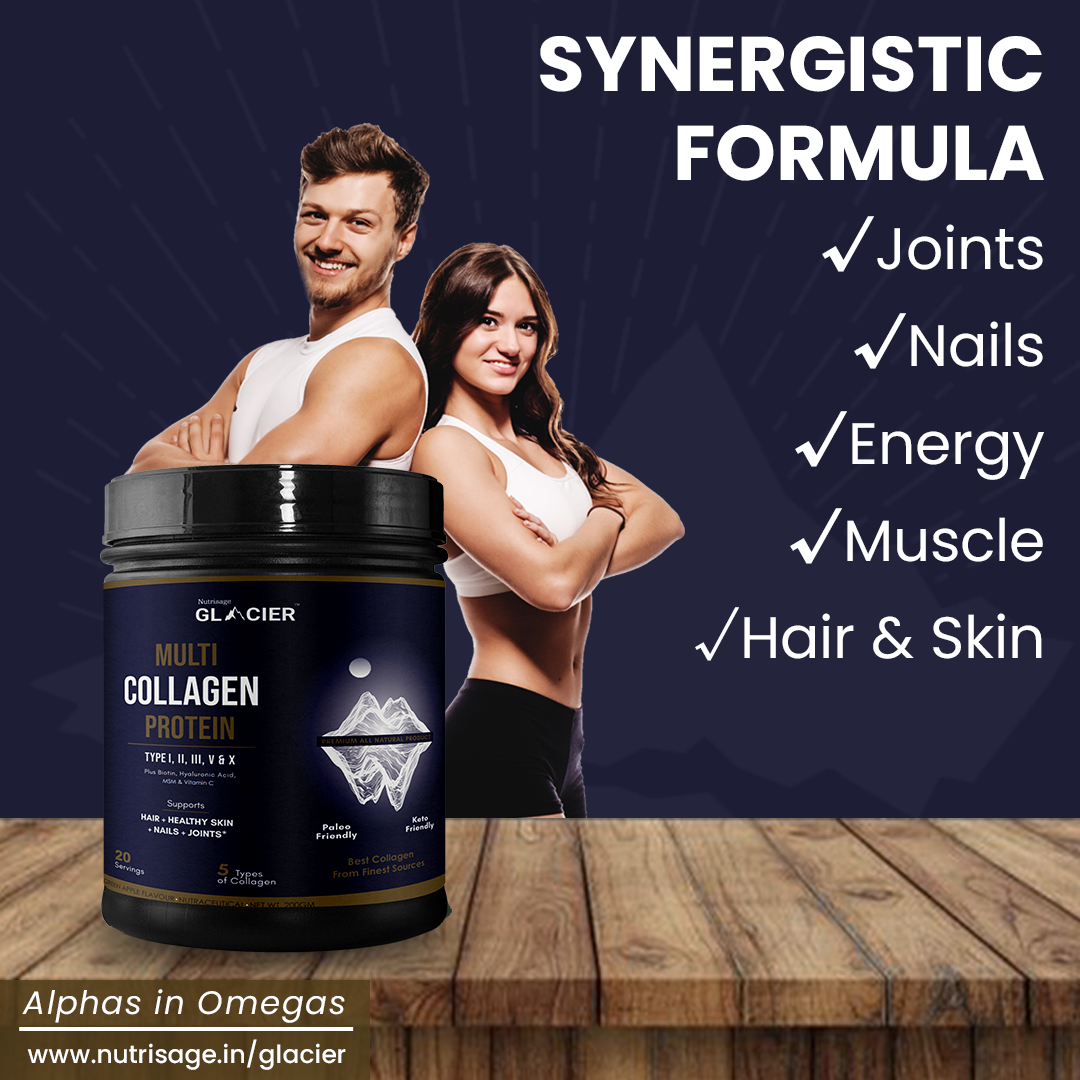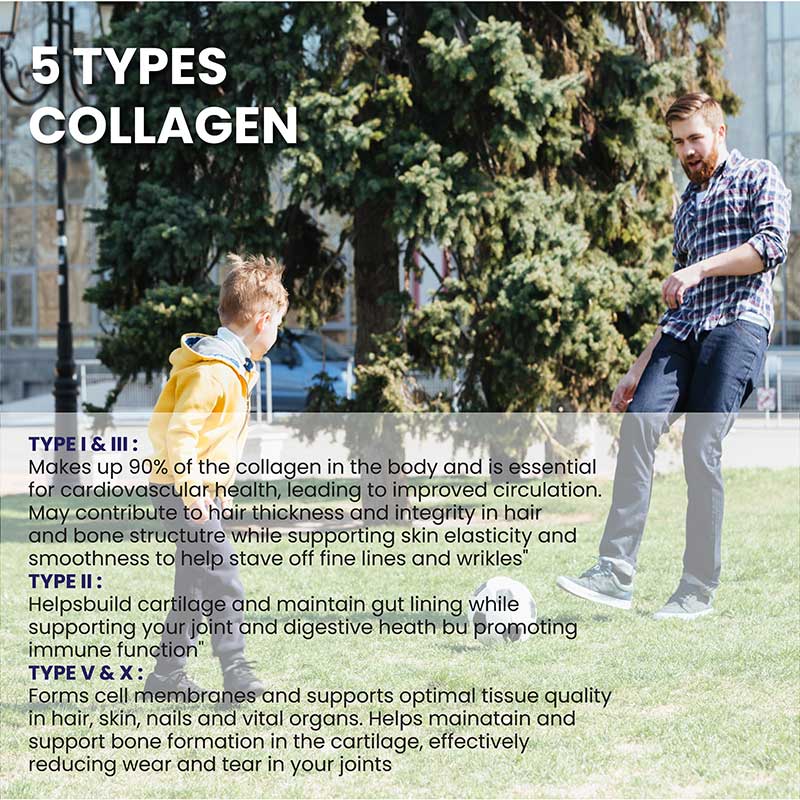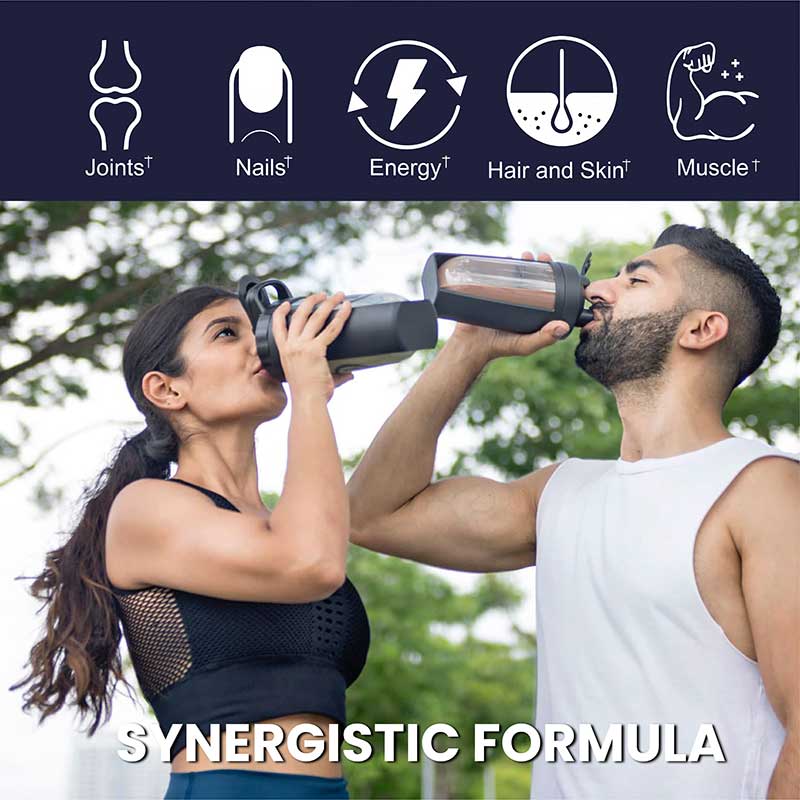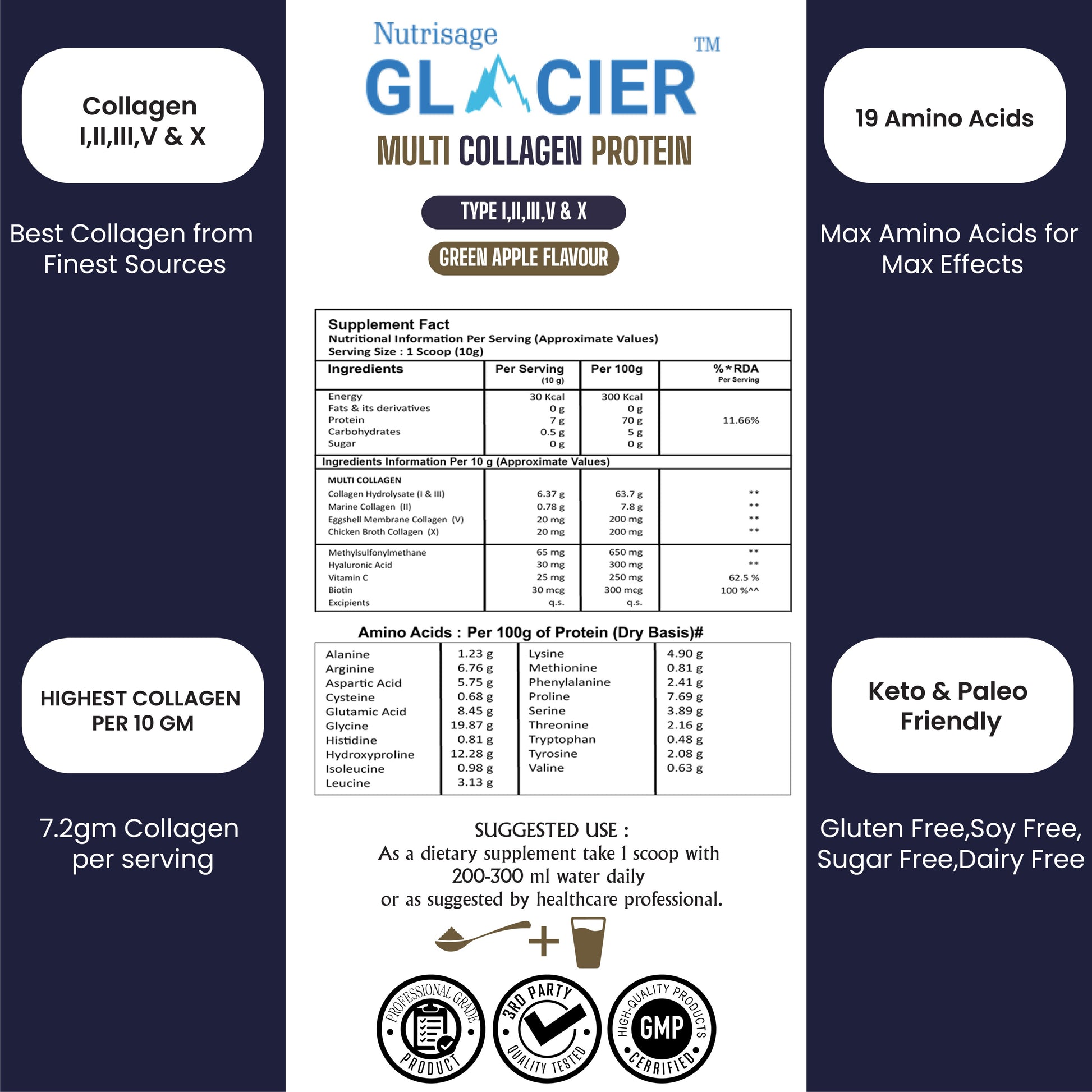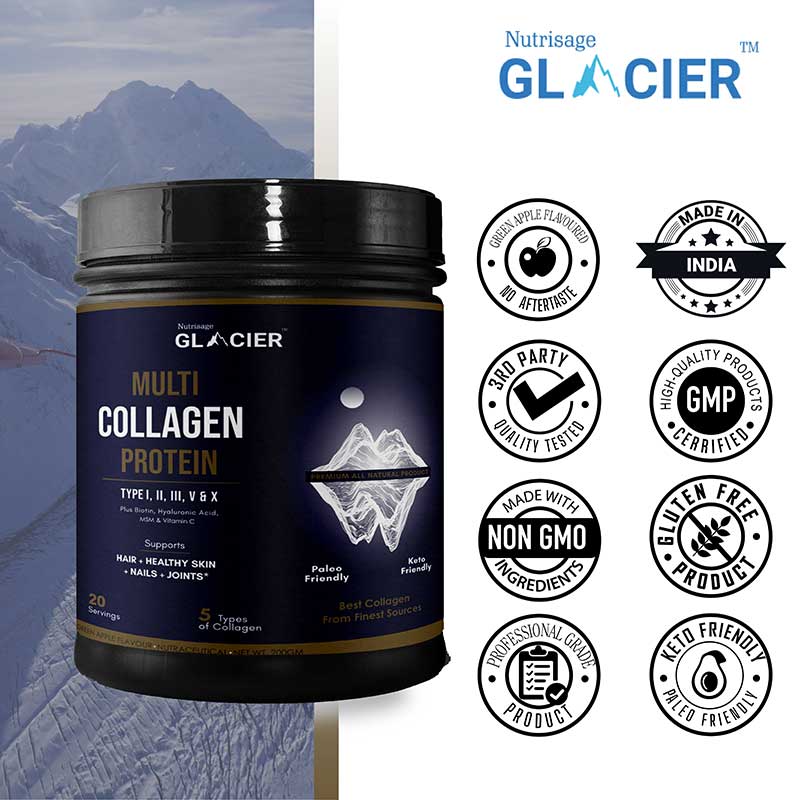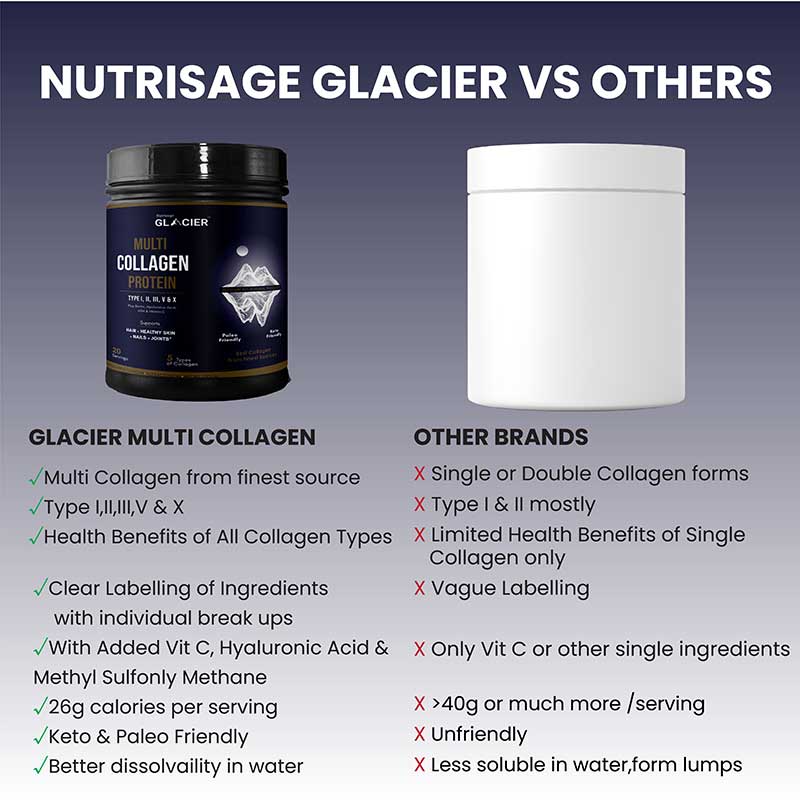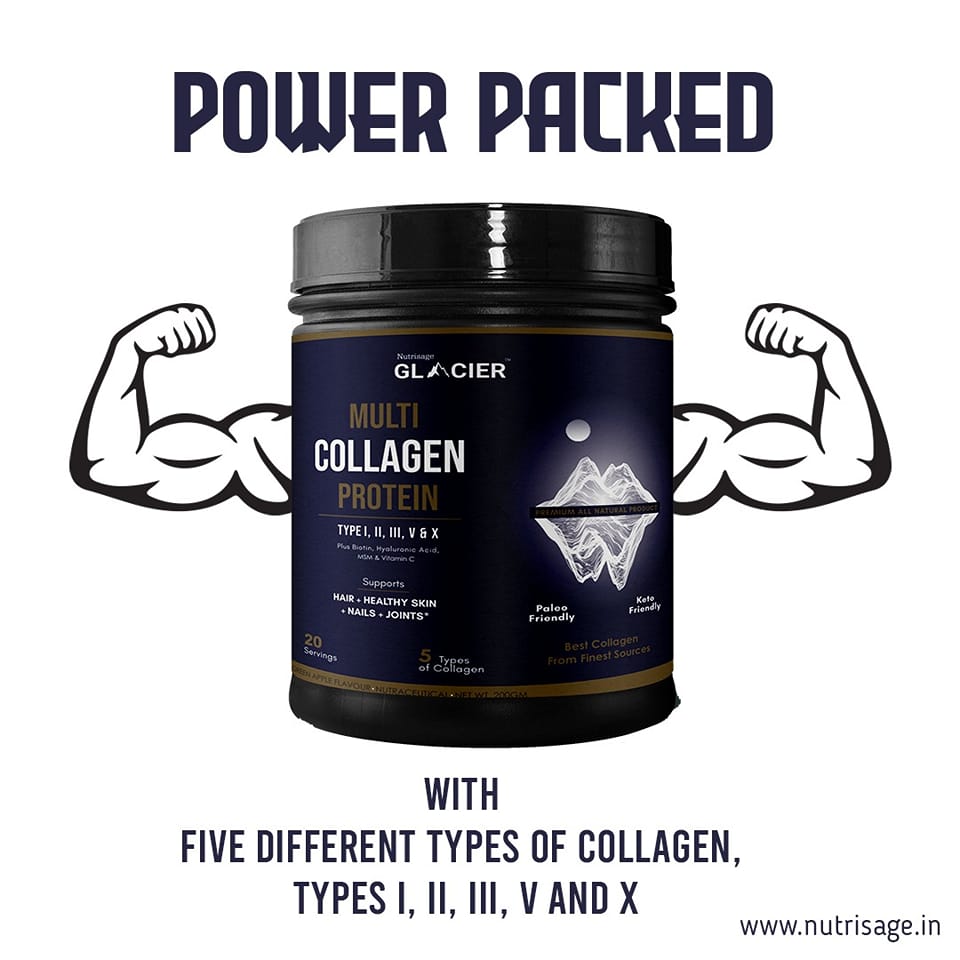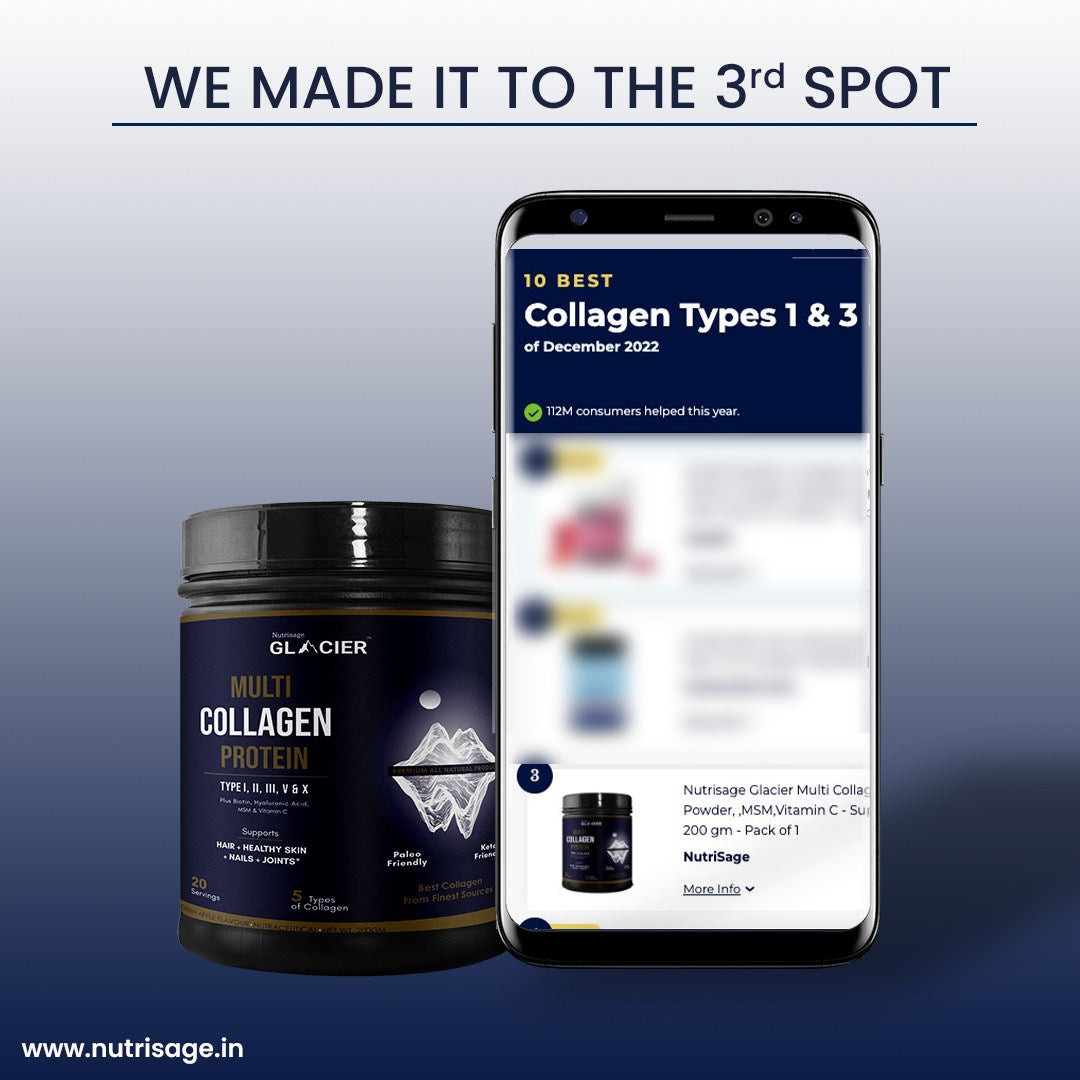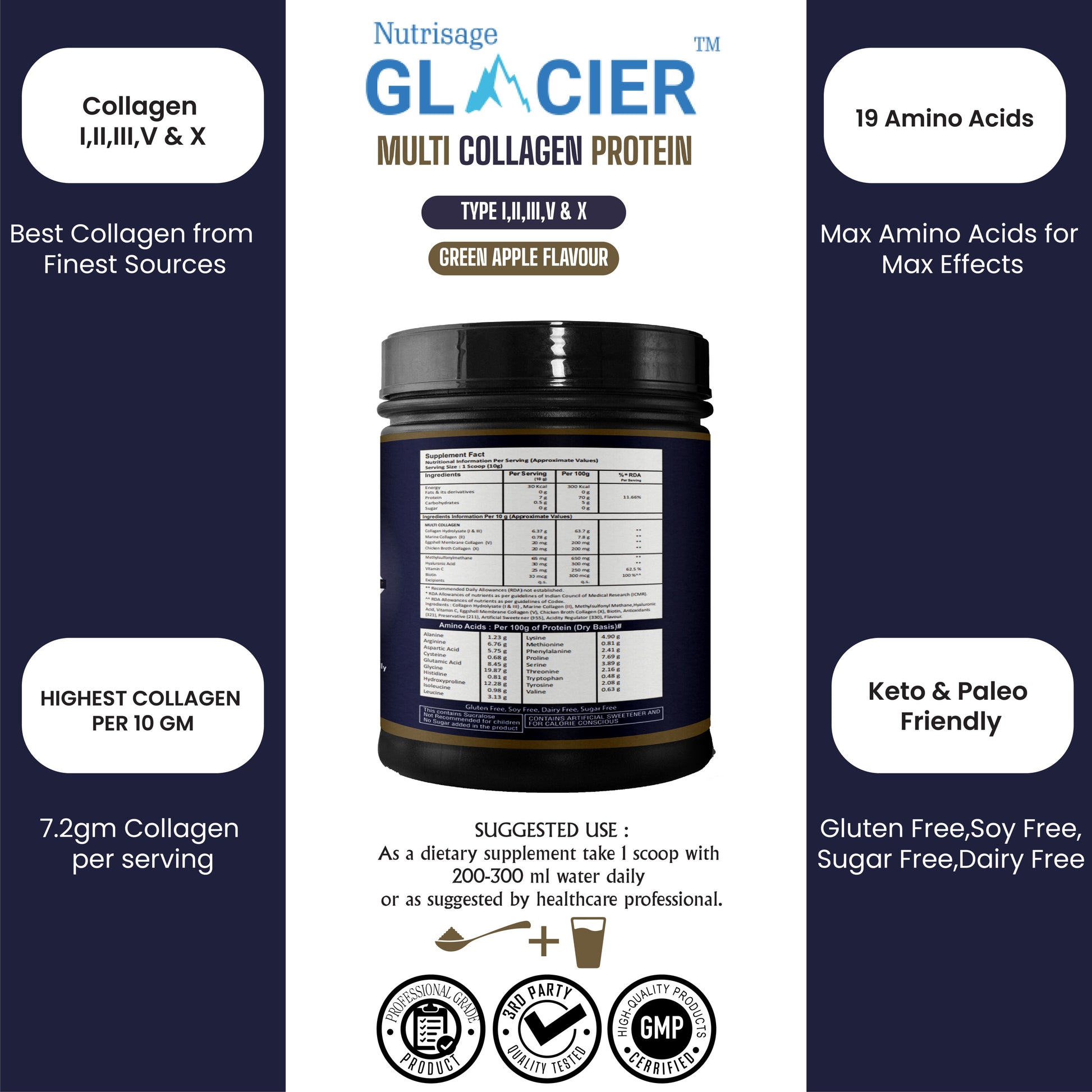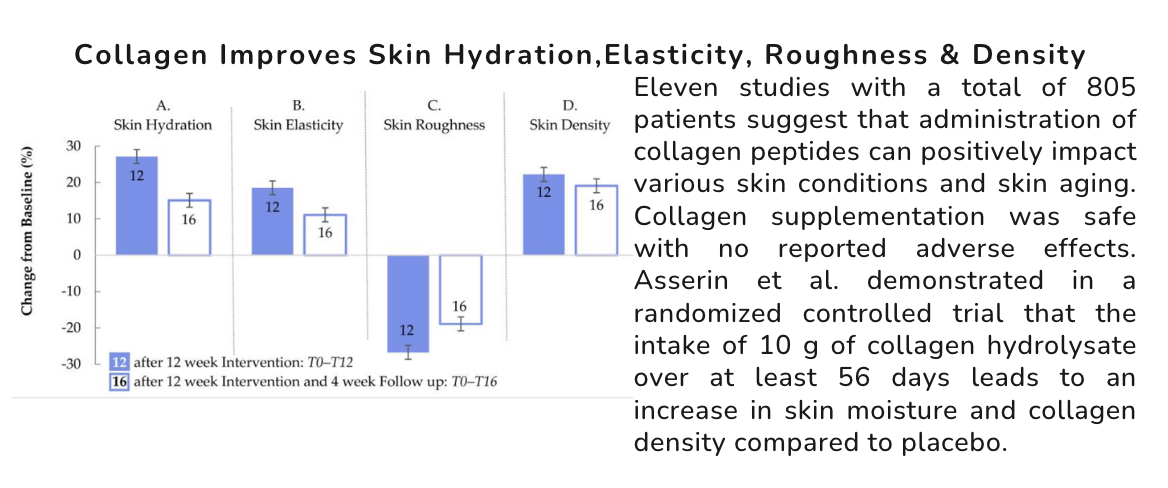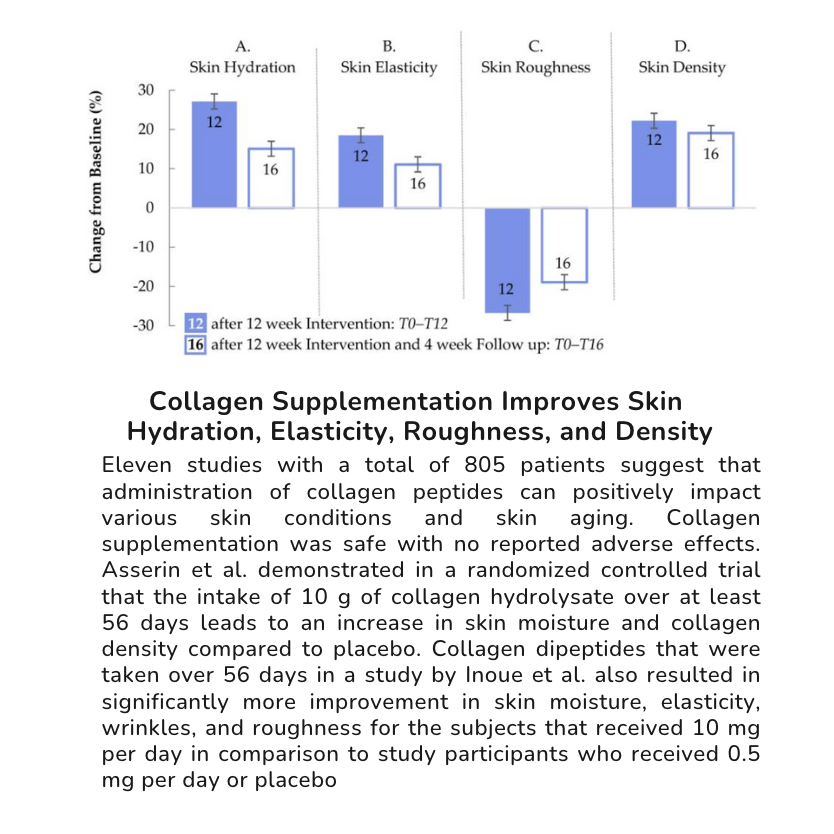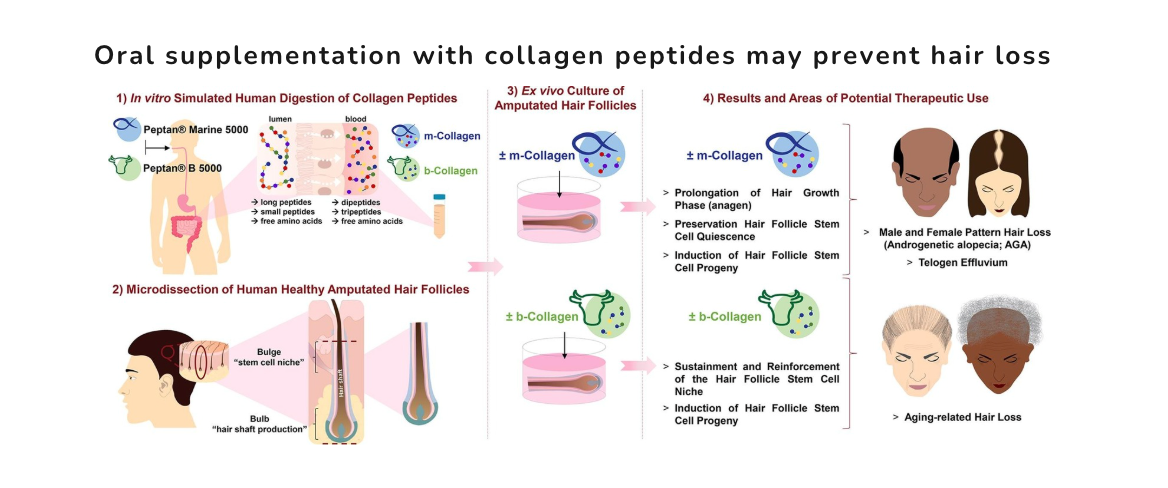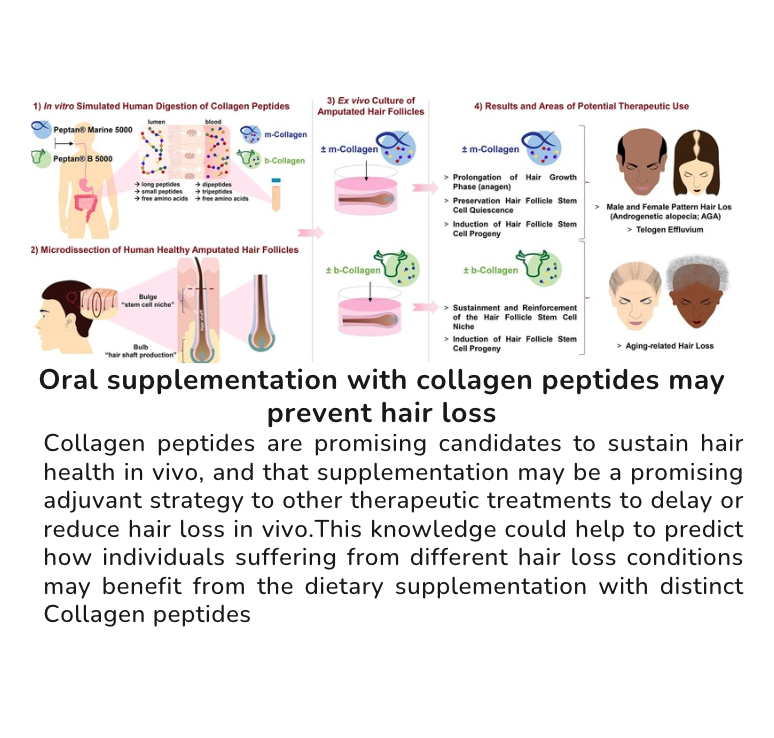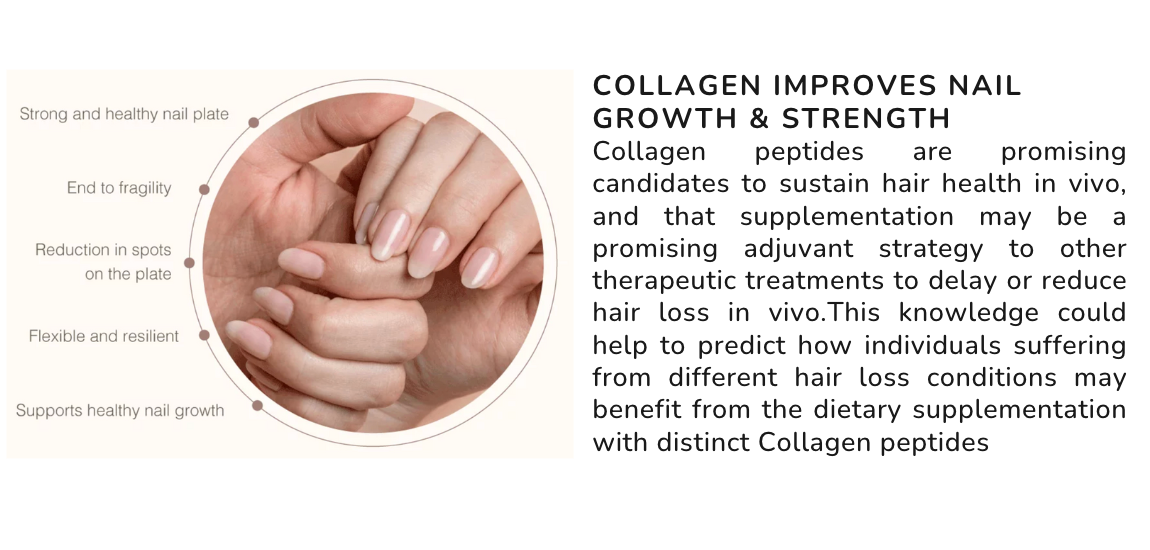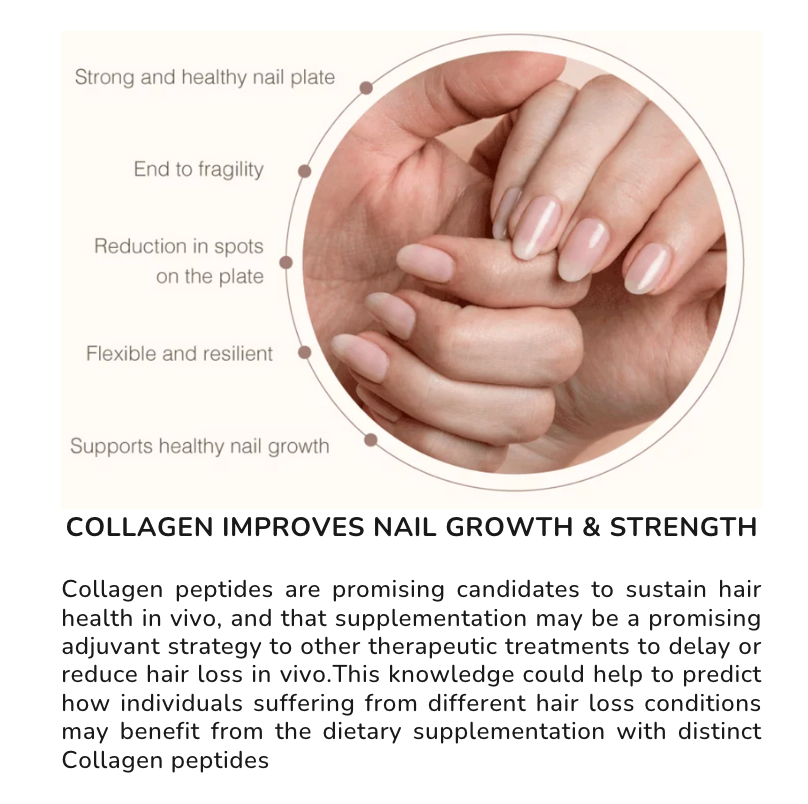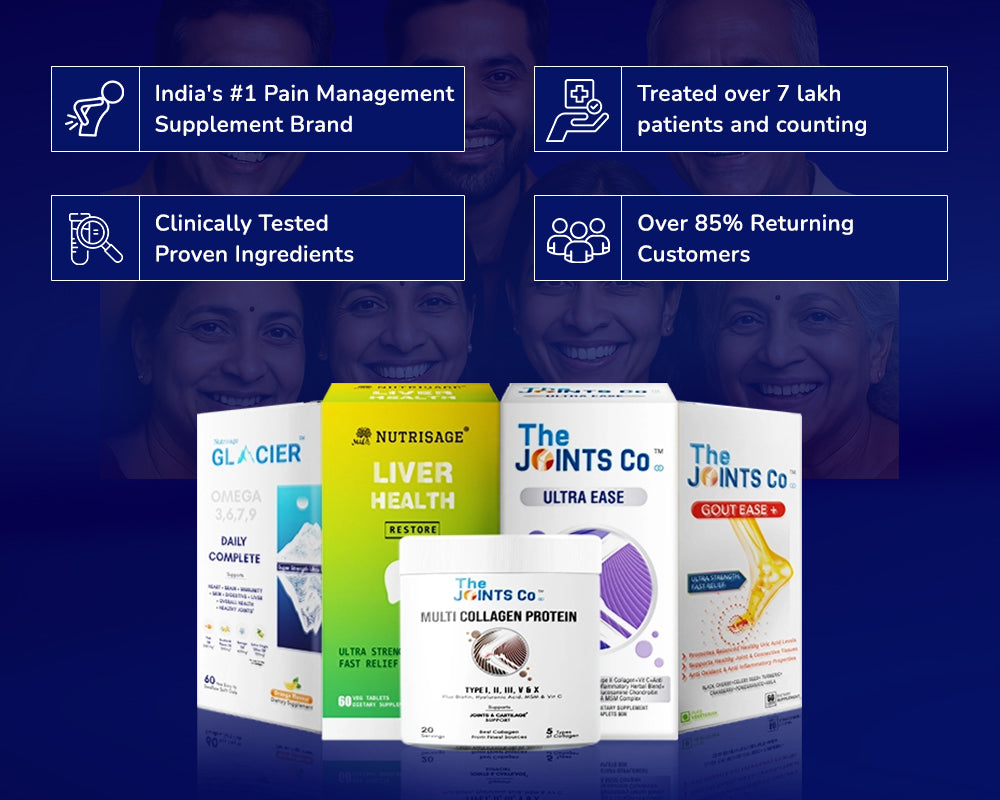Nutrisage India
Glacier Daily Multi Collagen Powder
Glacier Daily Multi Collagen Powder
Couldn't load pickup availability

Nutrisage Multi Collagen Hydrolysed Peptides Powder -Easy to Dissolve - Type I, II, III, V, X - for Women & Men - Promotes Hair, Skin, Nails, & Joint Health 200 gm
✅ MULTI-COLLAGEN FORMULA: In order to provide the highest quality collagen available, our collagen is formulated from multiple and finest sources. Together these sources create a synergistic blend which provides five different types of collagen, types I, II, III, V and X. Carefully crafted and lovingly perfected, our multi-collagen protein is optimised for maximum potency and results.
✅ SUPER EASY TO USE POWDER SUPPLEMENT: Easy-to-mix Collagen can be added to a wide variety of healthy foods and beverages, giving you a protein powder boost.
✅ WHY COLLAGEN?: Collagen is the most abundant protein in the human body, making up a large portion of the skin, hair, nails and connective tissues. However, collagen production declines as we age and it is important to keep our natural levels topped up.
✅ HIGH PROTEIN, LOW CALORIE: : Our multi-collagen protein powder packs a powerful 7.2 grams of protein into each scoop, at just 26 calories a heap. Green Apple Flavoured, it’s easy to integrate into your diet. Simply add a heaped scoop into water,stir & drink. It could not be a simpler addition to your diet!
✅ FRESHNESS, POTENCY AND PURITY GUARANTEED - Like all Nutrisage products, Our Collagen Powder is made in ISO & GMP Certified facility & 3rd party tested for freshness, potency, and purity.

How long does it take for Collagen to work?
The time frame for expecting results from your collagen supplements is entirely dependent on your desired outcome and health support focus area.* “Results” means something entirely different for the bones than it does for the gut or skin.
So having said that, here’s a mini overview of the amount of time clinical research suggests it takes to see benefits.*
- Skin support benefits: 4 to 12 weeks (1 to 3 months)
- Muscle mass and strength (combined with resistance training): 3 months
- Less soreness after physical training: within a few days
- Joint health support: 4 to 6 months
- Tendon support (combined with strengthening exercise): 3 to 6 months
- Bone-density support: 12 months
- Hair & Nails: 6 months
Share
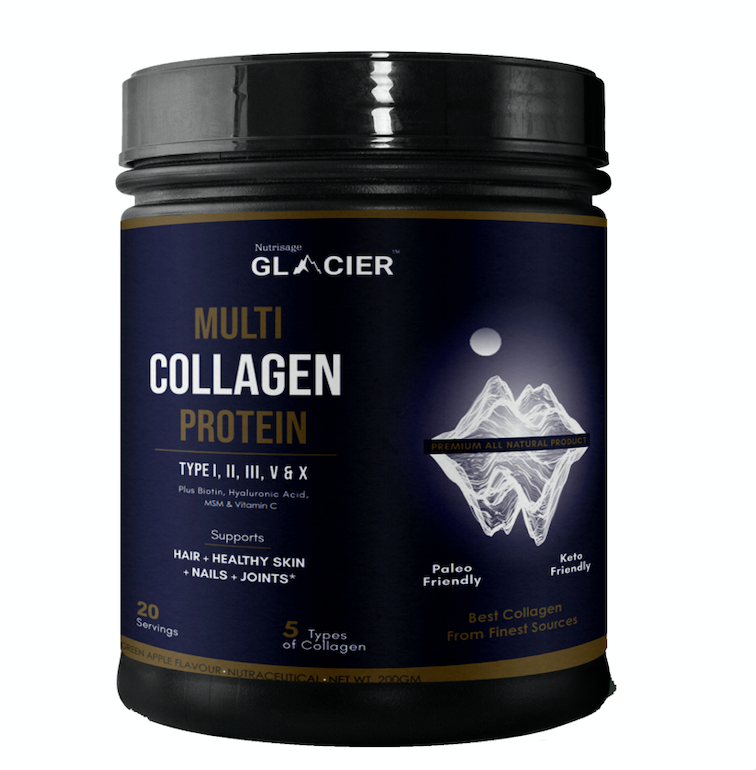
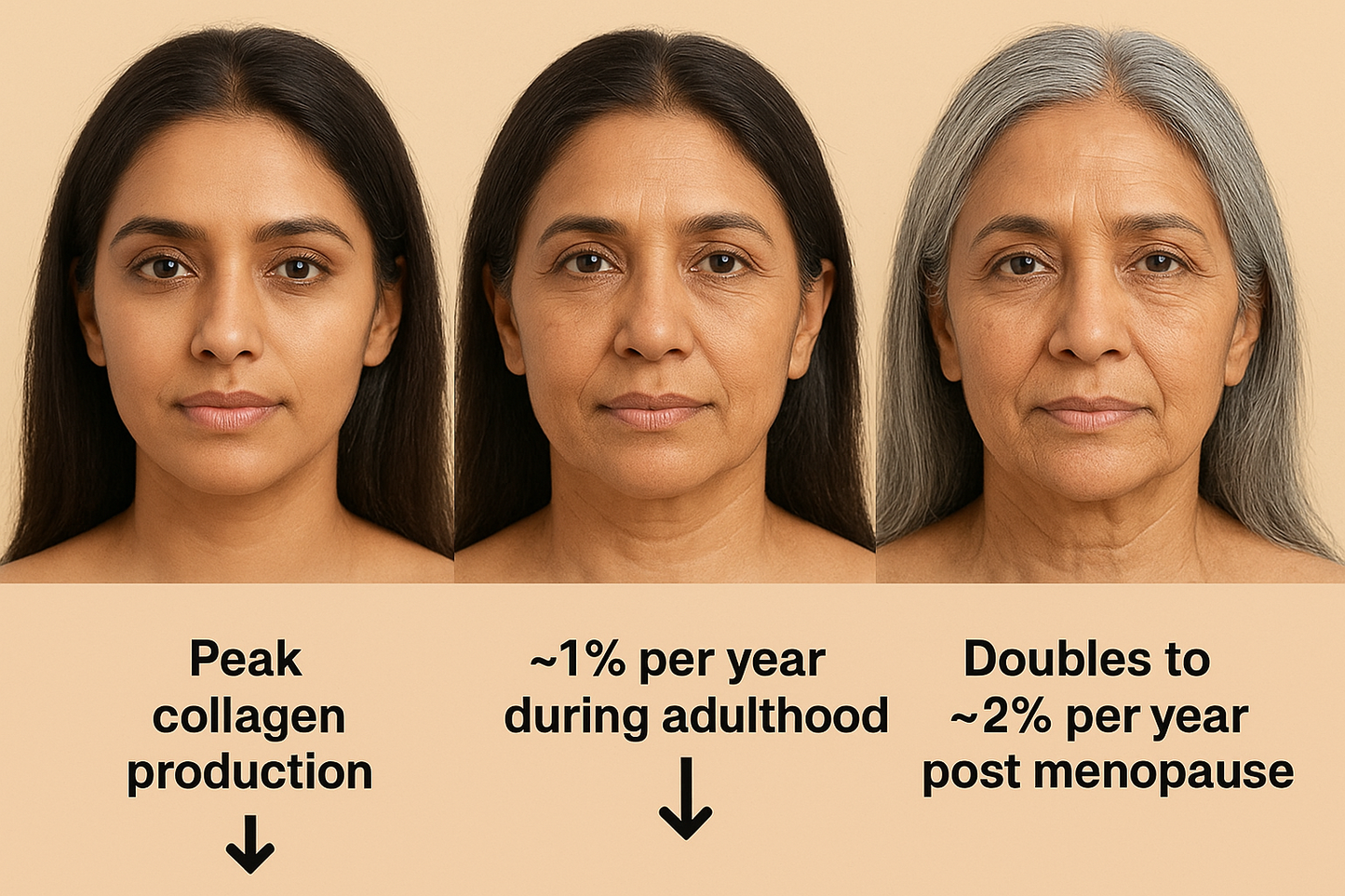
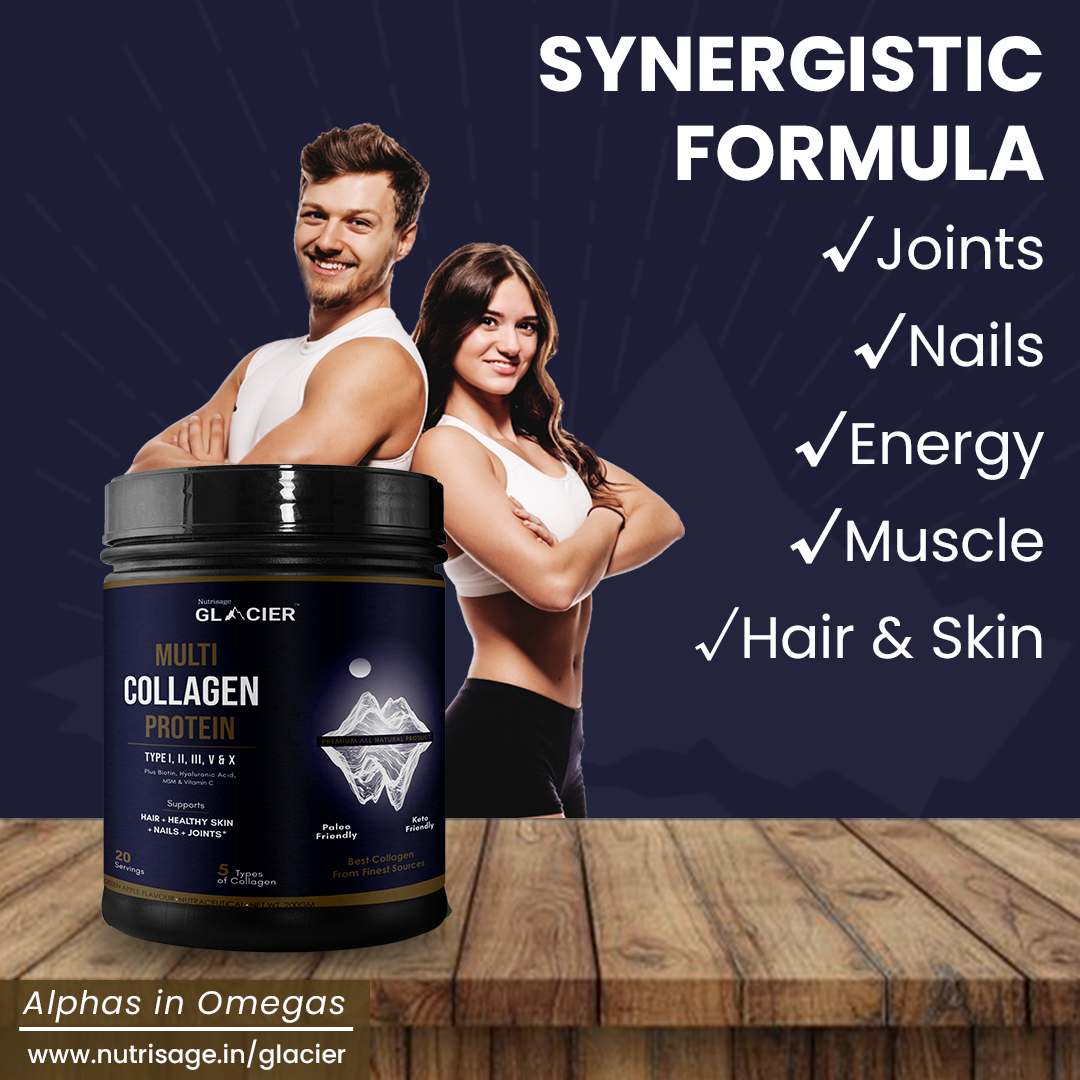

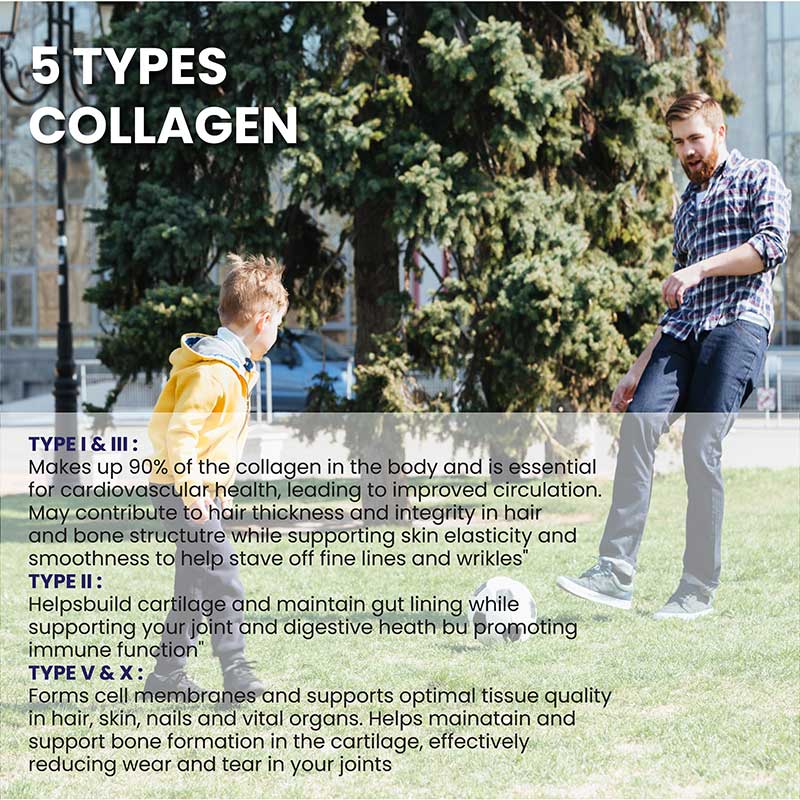
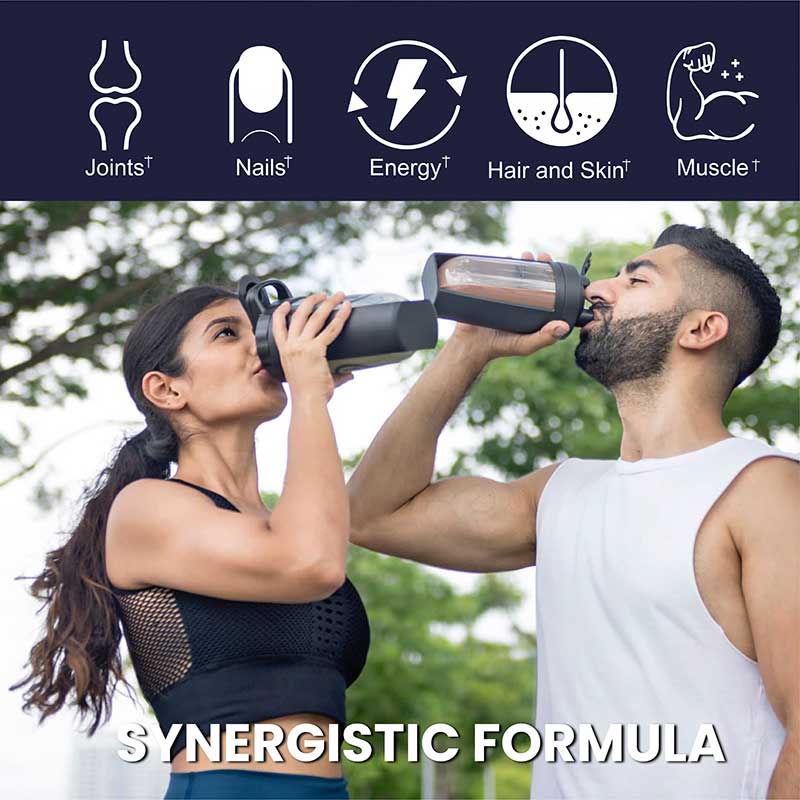
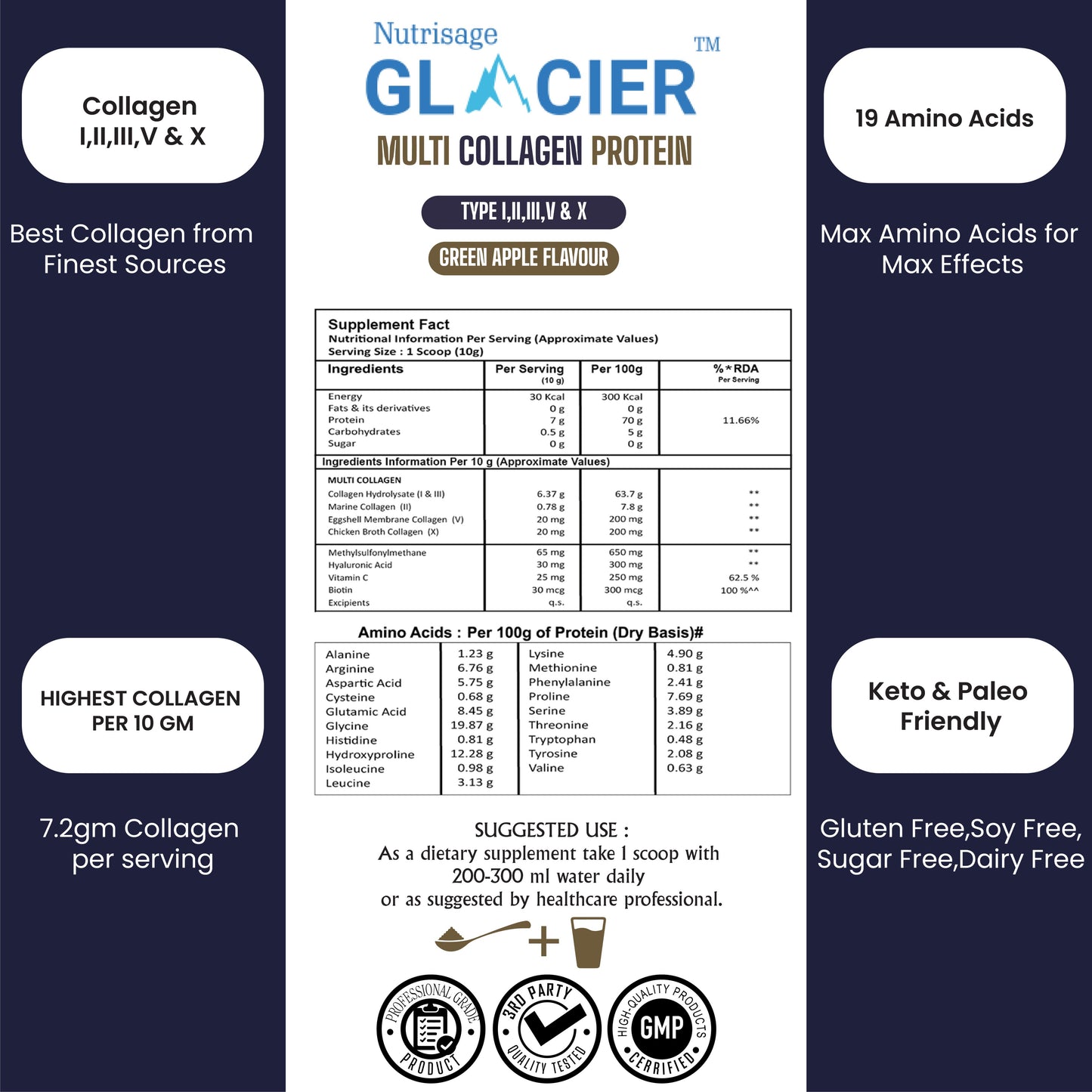
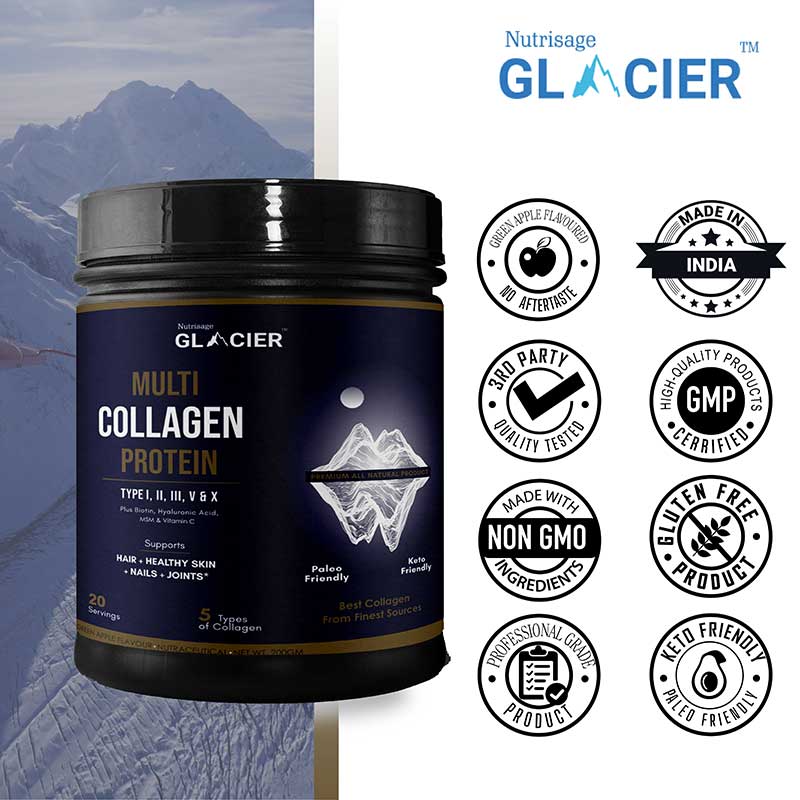
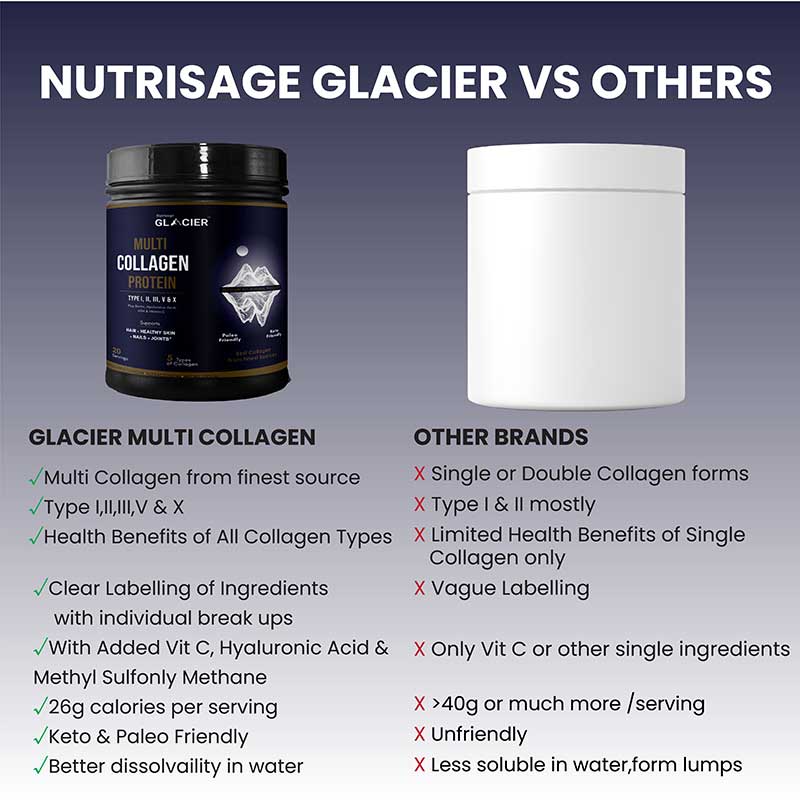
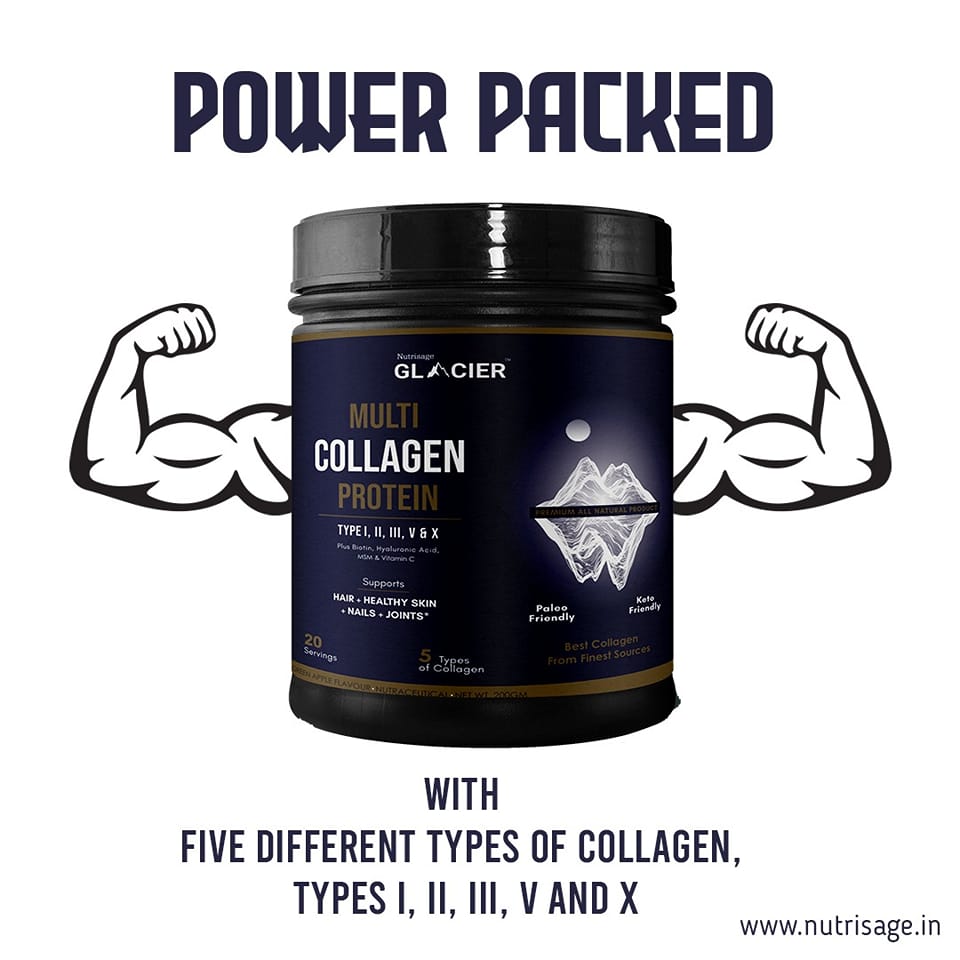
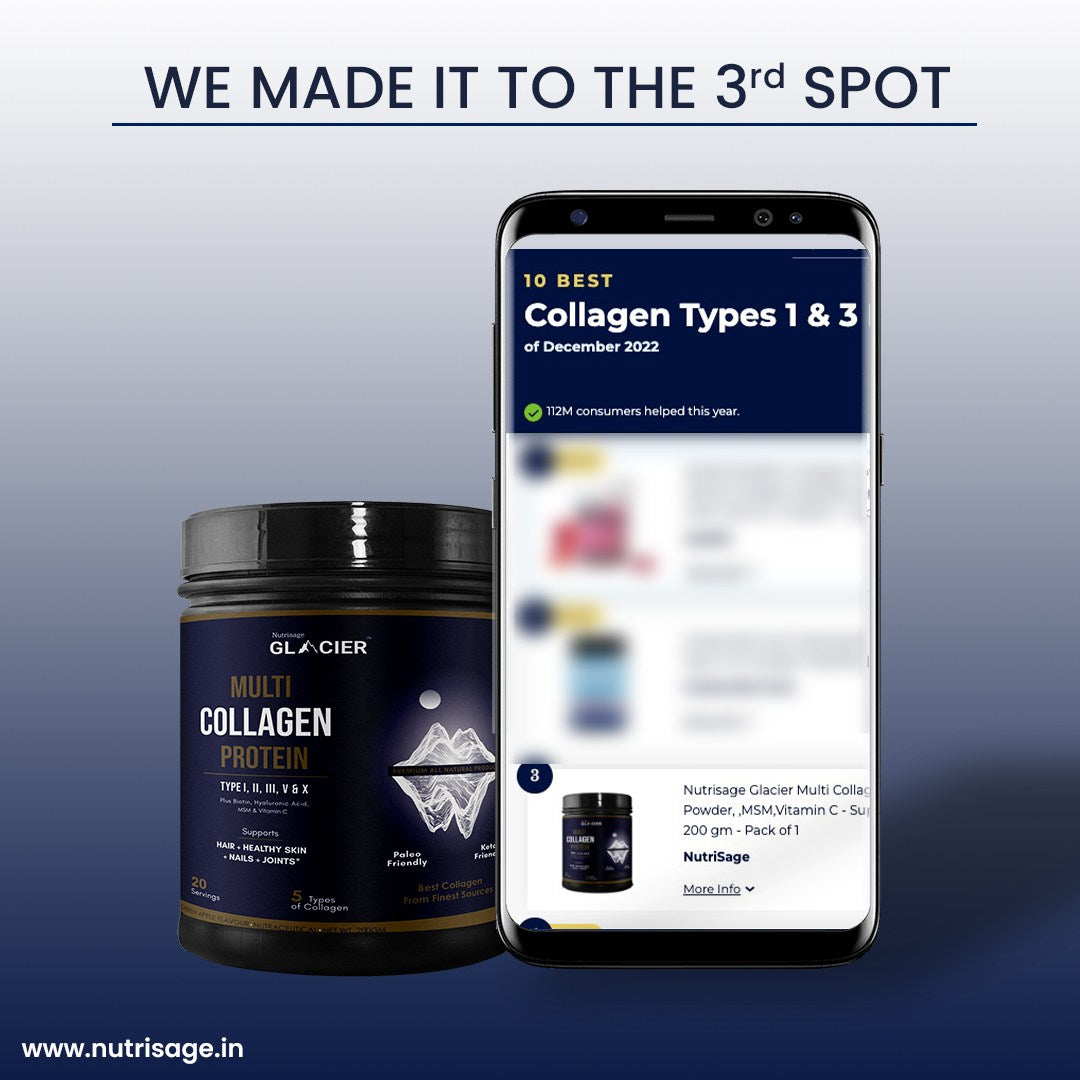
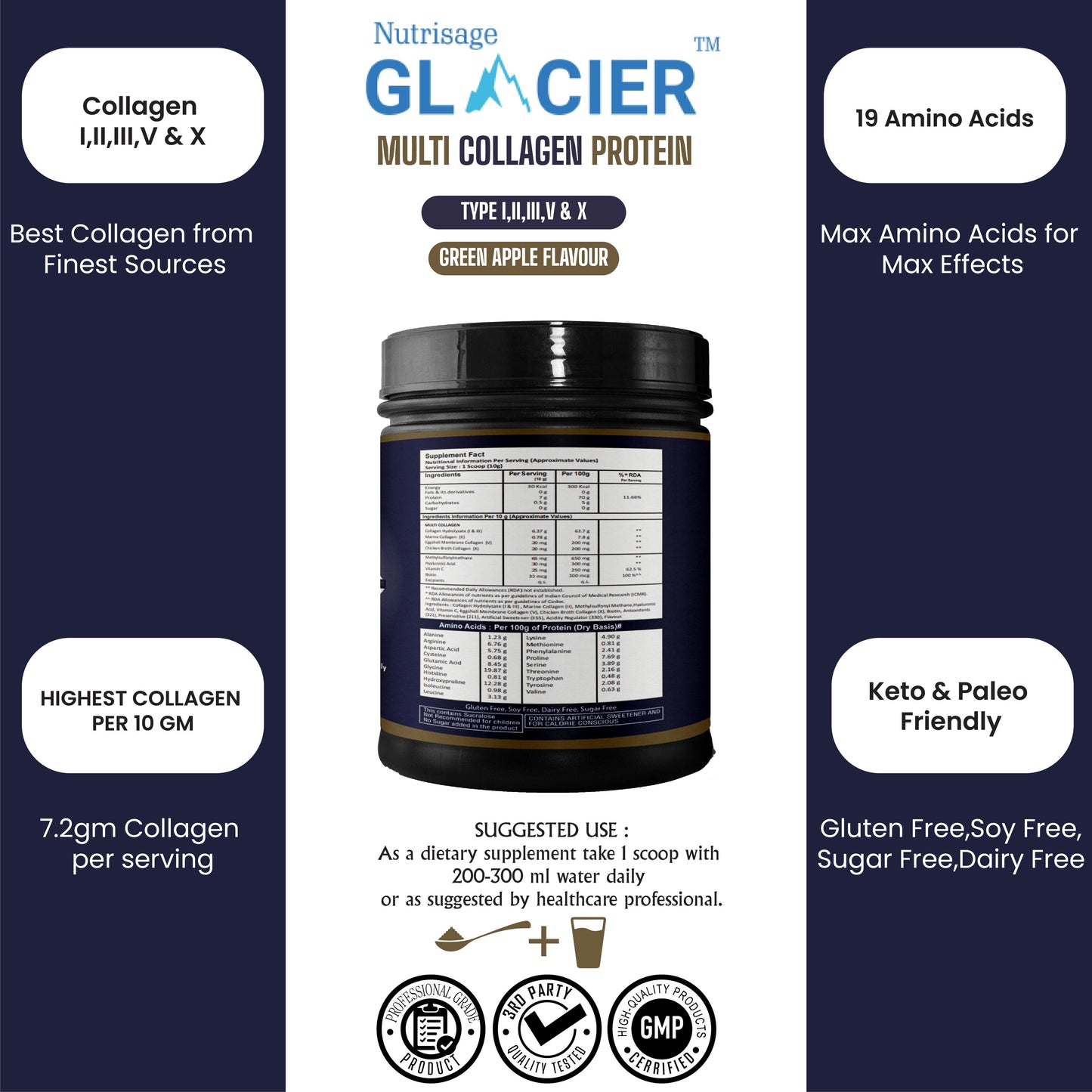
FAQ'S
What is Collagen?
Collagen is the most abundant fibrous protein in the body. Think of it as the “glue” that holds your body together. It’s the structural component that makes up connective tissues, like tendons and cartilage and it plays an important role in our bones, hair, skin and nails, our joints and even the gut . Needless to say, it’s a pretty important part of the body!
This fibrous protein made up of long chains of amino acids, specifically glycine, proline, and hydroxyproline. These amino acids form a unique triple-helix structure that gives collagen its strength and stability. There are several different types of collagen, each with its own unique properties and functions in the body.
Since Our bodies can make these amino acids, so they are considered non-essential, but as we age, collagen in the body begins to deteriorate and production slows. This process starts in the late 20s early 30s and is most noticeable in our skin as fine lines and wrinkles. As we produce less collagen, other noticeable issues include brittle hair and nails, digestion issues, more pronounced cellulite and joint pain.
so in short collagen helps in improving the health and appearance of the skin, as well as to support joint health and muscle growth.
What is Multi Collagen? What is so special about them?
There are 28 different types of collagen found in different parts of the body. The different amino acid makeup of each type of collagen depends on the type of structure it’s apart of (joint cartilage vs. gut lining). However, there are five main types of collagen, three of which (Type I, Type II ,Type III,Type V & Type X) are popular in supplements on the market.
Type I –
Type 1 collagen is the most abundant type of collagen in the human body, and it is found in many tissues, including the skin, bones, tendons, ligaments, and teeth. It plays a vital role in maintaining the structural integrity of these tissues and supporting their function.
In the skin, type 1 collagen provides strength and elasticity, helping to maintain the skin's firmness and smoothness. As we age, the natural production of type 1 collagen can decrease, leading to wrinkles, sagging skin, and other signs of aging. This is why type 1 collagen is often used in skincare products and supplements to support skin health and reduce the appearance of aging
Type II –
Type II collagen is a specific type of collagen that is primarily found in cartilage, which is the flexible connective tissue that cushions our joints. It plays an essential role in maintaining the health and integrity of our joint tissues.
As we age, the natural production of type 2 collagen can decrease, which can lead to joint discomfort, stiffness, and other symptoms of joint wear and tear. This is why type 2 collagen is often used in supplements and other products to support joint health and relieve joint pain.
Type III –
Type III collagen is another type of collagen that is found in many tissues in the body, particularly in soft tissues such as skin, muscles, blood vessels, and organs. It is often found in conjunction with type I collagen, and the two types of collagen work together to provide strength and support to these tissues.
In the skin, type III collagen provides elasticity and firmness, helping to maintain the skin's structure and appearance. It is particularly important for skin healing and recovery after injury or surgery.
In the muscles, type III collagen is found in the connective tissue surrounding muscle fibers, where it helps to provide support and structure. It may also play a role in muscle repair and regeneration.
In the blood vessels, type III collagen helps to provide strength and support, helping to maintain healthy blood flow and blood pressure. It is also found in the walls of internal organs, where it helps to maintain their structure and function.
Type V-
Type V collagen is a minor type of collagen that is found in small amounts in several tissues, including the skin, tendons, and placenta. It is structurally similar to type I collagen but has some unique properties that make it important for specific functions in the body.
In the skin, type V collagen is found alongside type I collagen and helps to regulate the organization of collagen fibers. It may also play a role in the development and maintenance of hair follicles.
In tendons, type V collagen is found alongside type I collagen and helps to maintain the strength and elasticity of these tissues.
In the placenta, type V collagen helps to provide structural support and stability, playing a role in the development of the placenta during pregnancy. Type V collagen is a minor type of collagen that is found in small amounts in several tissues, including the skin, tendons, and placenta. It is structurally similar to type I collagen but has some unique properties that make it important for specific functions in the body.
In the skin, type V collagen is found alongside type I collagen and helps to regulate the organization of collagen fibers. It may also play a role in the development and maintenance of hair follicles.
In tendons, type V collagen is found alongside type I collagen and helps to maintain the strength and elasticity of these tissues.
In the placenta, type V collagen helps to provide structural support and stability, playing a role in the development of the placenta during pregnancy.
Type V collagen is usually sourced from the membranes of eggshells.
Type X –
Type X collagen is involved in the regulation and maintenance of chondrocyte function, which are the cells that produce and maintain cartilage tissue. It plays a critical role in the formation and growth of new bone tissue during skeletal development.
In addition to its role in skeletal development, type X collagen has been shown to play a role in the development and progression of osteoarthritis, a common degenerative joint disease. Increased levels of type X collagen have been found in osteoarthritic cartilage, suggesting that it may contribute to the progression of the disease.
Although type X collagen is a minor type of collagen, its importance in skeletal development and the potential role in osteoarthritis make it a subject of ongoing research to better understand its function and potential therapeutic applications.
Type X is made from chicken and bovine sources.
Why should one opt for Multi Collagen supplement?
Multi Collagen Supplements offers various benefits Vs Normal Collagen Supplements.
Skin – various forms and dosages of collagen have been studies that show improvements in skin elasticity, keeping skin looking younger and preventing against the signs of aging by keeping skin firm and hydrated. Research also shows that this can increase the smoothness and help reduce the appearance of cellulite.
Hair and Nails – as collagen production slows, hair and nails can become brittle and weak. Collagen can help hydrate your hair and nails, helping them grow faster and thicker.
Bone and Joint Health – Collagen has been shown to can help reduce inflammation. This can be extremely beneficial for those with Rheumatoid Arthritis, Osteoporosis or another inflammatory disorders. Collagen also helps in preventing the breakdown of joints, especially in individuals osteoarthritis. Another study found that athletes given the collagen supplement had less joint pain than those that did not receive the supplement.
Gut Lining – Numerous studies have shown that those with inflammatory bowel diseases have less collagen in the lining of their intestines . Collagen is 30% glycine. Glycine is shown to help repair leaky-gut, a condition where the lining of the small intestine becomes damaged, causing undigested food particles, waste products and bacteria to “leak” through the intestines into the bloodstream . Collagen can helps restore the lining of the stomach and intestines and improves nutrient absorption
Muscle gain and satiety – Protein is an important part of the diet and out of all the macronutrients provides the most satiety – meaning it keeps you full longer. Adding collagen can also help with muscle gain when combined with strength training by providing necessary amino acids for muscle growth and recovery following exercise.
Is there any fact that I should know about, prior to taking this supplement?
The Collagen is a carefully formulated dietary supplement. As a general precaution; if you are pregnant, nursing, under 18 or on prescription medicines, please consult your healthcare professional before use. It does not promise miraculous results. However, it supports your healthy diet. The product should be stored in a cool, dry place. Close the cap tightly after each use.
Any side effect of taking Multi Collage Supplement?
Multi Collagen Supplements are generally very safe and well-tolerated, especially since collagen is a protein your body naturally produces. For most people, there are no serious side effects — just beauty and wellness benefits.
A few things to keep in mind:
- Some people may experience mild bloating or fullness in the first few days, which usually goes away as your body adjusts.
- If you have allergies to fish, eggs, or chicken, check the ingredient source before use.
- Pregnant or breastfeeding women should consult a healthcare professional before starting any supplement.
Overall, Multi Collagen is considered a gentle, natural way to support glowing skin, stronger hair and nails, and healthy joints — with minimal risk of unwanted effects.
Can I tell if my body’s collagen level is decreasing?
- Skin that's wrinkled, crepey or sagging.
- Hallowing in and around your eyes and face.
- Shrinking, weakening muscles and muscle aches.
- Stiffer, less flexible tendons and ligaments.
- Joint pain or osteoarthritis due to worn cartilage.
- Loss of mobility due to joint damage or stiffness.
- Gastrointestinal problems due to thinning of the lining of your digestive tract.
- Problems with blood flow.
RESULTS YOU CAN FEEL
What is Collagen and how its beneficial for you?
Multi collagen is a blend of different types of collagen (commonly Type I, II, III, V, and X), which together support the body’s structural and functional health. Collagen is the most abundant protein in the body, forming the foundation of skin, hair, nails, joints, bones, and connective tissues. Collagen loss is a real, measurable process that steadily worsens with age (≈1–1.5%/yr in skin studies) and contributes to internal structural decline in bone, cartilage, tendons, ligaments and vessels.
Taking multi collagen helps improve skin elasticity and hydration, strengthens nails and hair, supports joint flexibility and cartilage repair, promotes bone density, and aids muscle recovery
TAKE ACTION TODAY
Early Intervention is in your Hands
-
High Chances of
Bone Fragility / Increased Fracture Risk
-
High Chances of
Joint Degeneration / Arthritis / Cartilage wear
-
High Chances of
Skin Aging / Loss of Elasticity
HOW TO USE
-
Step I:
Take half scoop X 2 times a day
-
Step II:
Mix well in 1 glass of water(200 ml)
-
Step III:
Consume twice a day for optimal results.You must use this product for 3-4 consecutive months to get the maximum value since this is the time recommended to correct any collagen related deficiencies and deliver best results.*
Made with Clinically proven,More Bioavailable Ingredients
INGREDIENTS
Type X
Type X collagen is involved in the regulation and maintenance of chondrocyte function, which are the cells that produce and maintain cartilage tissue. It plays a critical role in the formation and growth of new bone tissue during skeletal development.
In addition to its role in skeletal development, type X collagen has been shown to play a role in the development and progression of osteoarthritis, a common degenerative joint disease. Increased levels of type X collagen have been found in osteoarthritic cartilage, suggesting that it may contribute to the progression of the disease.
Although type X collagen is a minor type of collagen, its importance in skeletal development and the potential role in osteoarthritis make it a subject of ongoing research to better understand its function and potential therapeutic applications.
Type X is made from chicken and bovine sources.
Type V
Type V collagen is a minor type of collagen that is found in small amounts in several tissues, including the skin, tendons, and placenta. It is structurally similar to type I collagen but has some unique properties that make it important for specific functions in the body.
In the skin, type V collagen is found alongside type I collagen and helps to regulate the organization of collagen fibers. It may also play a role in the development and maintenance of hair follicles.
In tendons, type V collagen is found alongside type I collagen and helps to maintain the strength and elasticity of these tissues.
In the placenta, type V collagen helps to provide structural support and stability, playing a role in the development of the placenta during pregnancy.
Type V collagen is a minor type of collagen that is found in small amounts in several tissues, including the skin, tendons, and placenta. It is structurally similar to type I collagen but has some unique properties that make it important for specific functions in the body.
In the skin, type V collagen is found alongside type I collagen and helps to regulate the organization of collagen fibers. It may also play a role in the development and maintenance of hair follicles.
In tendons, type V collagen is found alongside type I collagen and helps to maintain the strength and elasticity of these tissues.
In the placenta, type V collagen helps to provide structural support and stability, playing a role in the development of the placenta during pregnancy.
Type V collagen is usually sourced from the membranes of eggshells.
Type III
Type III collagen is another type of collagen that is found in many tissues in the body, particularly in soft tissues such as skin, muscles, blood vessels, and organs. It is often found in conjunction with type I collagen, and the two types of collagen work together to provide strength and support to these tissues.
In the skin, type III collagen provides elasticity and firmness, helping to maintain the skin's structure and appearance. It is particularly important for skin healing and recovery after injury or surgery.
In the muscles, type III collagen is found in the connective tissue surrounding muscle fibers, where it helps to provide support and structure. It may also play a role in muscle repair and regeneration.
In the blood vessels, type III collagen helps to provide strength and support, helping to maintain healthy blood flow and blood pressure. It is also found in the walls of internal organs, where it helps to maintain their structure and function.
Type II
Type II collagen is a specific type of collagen that is primarily found in cartilage, which is the flexible connective tissue that cushions our joints. It plays an essential role in maintaining the health and integrity of our joint tissues.
As we age, the natural production of type 2 collagen can decrease, which can lead to joint discomfort, stiffness, and other symptoms of joint wear and tear. This is why type 2 collagen is often used in supplements and other products to support joint health and relieve joint pain
Type I
Type 1 collagen is the most abundant type of collagen in the human body, and it is found in many tissues, including the skin, bones, tendons, ligaments, and teeth. It plays a vital role in maintaining the structural integrity of these tissues and supporting their function.
In the skin, type 1 collagen provides strength and elasticity, helping to maintain the skin's firmness and smoothness. As we age, the natural production of type 1 collagen can decrease, leading to wrinkles, sagging skin, and other signs of aging. This is why type 1 collagen is often used in skincare products and supplements to support skin health and reduce the appearance of aging
19 amino acids
The 19 amino acids found in multi-collagen supplements are the building blocks of collagen, making them essential for strong joints, youthful skin, healthy hair, and resilient nails. Collagen itself is a protein made from key amino acids like glycine, proline, hydroxyproline, and alanine, which combine to form the triple-helix structure that gives collagen its strength and flexibility. These amino acids help repair and rebuild connective tissue, support cartilage health for smooth joint movement, and maintain skin elasticity to reduce fine lines and sagging. They also provide the raw materials for keratin production, which strengthens hair and nails from within. By supplying a complete profile of collagen-building amino acids, your body can efficiently produce and maintain collagen, leading to improved mobility, glowing skin, stronger nails, and healthier hair.
Methylsulfonylmethane (MSM)
Methylsulfonylmethane (MSM) is a natural sulfur compound that plays a key role in collagen production for healthy joints, skin, hair, and nails. Sulfur is an essential building block of collagen and keratin — the structural proteins that keep connective tissues strong and flexible. By supplying highly bioavailable sulfur, MSM supports the formation of collagen fibers, which helps maintain joint cushioning, reduce stiffness, and improve mobility. In the skin, MSM promotes firmness and elasticity by supporting new collagen synthesis and reducing breakdown caused by oxidative stress. It also strengthens hair and nails by enhancing keratin structure, leading to thicker, shinier hair and less brittle nails. Additionally, MSM’s anti-inflammatory and antioxidant properties create a healthier environment for collagen production, amplifying its benefits for overall beauty and joint health.
Vitamin C
Vitamin C is one of the most essential nutrients for collagen production in the body, making it a key beauty and joint-support ingredient. It acts as a cofactor for the enzymes that help form and stabilize collagen fibers, ensuring they are strong, flexible, and functional. For joints, Vitamin C supports the production of collagen in cartilage, helping maintain cushioning and mobility. In the skin, it boosts firmness and elasticity, while also protecting against free radical damage that can break down collagen and cause premature aging. For hair and nails, Vitamin C improves blood circulation and nutrient delivery to the follicles and nail beds, supporting healthier growth and strength. By both stimulating collagen synthesis and preventing its breakdown, Vitamin C is essential for youthful skin, shiny hair, strong nails, and resilient joints
Hyaluronic acid
Hyaluronic acid (HA) is a powerhouse ingredient that supports beauty collagen by creating the perfect environment for healthy collagen production in the skin, hair, and nails. HA acts like a moisture magnet, holding up to 1,000 times its weight in water, keeping skin cells plump and hydrated. This deep hydration reduces collagen breakdown, improves elasticity, and signals fibroblasts (collagen-producing cells) to make more collagen naturally. With stronger collagen networks, skin looks firmer and smoother, fine lines and wrinkles appear less visible, and nails and hair receive better hydration and nutrient delivery, making them stronger and shinier. By maintaining optimal moisture balance and stimulating collagen synthesis, hyaluronic acid is a key ally in achieving youthful, radiant skin and healthy hair and nails.
Developed By Scientists And Prescribed By Doctors
it gave amazing result on my skin and falling hair
I've been using Nutrisage Multi Collagen for several months now, and I can't imagine my skincare and wellness routine without it , not only does it help reduce the appearance of fine lines and wrinkles, but it also supports muscle recovery after intense workouts.
my nails and hair health became strong
market main aur logon se to aachi banai hai, per please aur lag flavor ka bhi laiye
bahut kaam ka hai.
B Joints Health best powdered collagen chicken collagen collagen collagen dosage collagen for hair nails skin collagen for joints collagen for skin collagen glucosamine chondroitin MSM collagen is collagen peptides collagen powder collagen powder benefits collagen protein collagen supplement collagen supplementation collagen tablets collagen use eggshell membrane collagen grass fed collagen grass-fed bovine collagen hydrolysed collagen hydrolyzed collagen marine collagen multi collagen multi collagen peptides multi collagen powder powdered collagen Skin/Hair Health type 1 collagen type 2 collagen type I collagen type II collagen type III collagen type V collagen type X collagen unflavoured collagen powder use of collagen peptide

